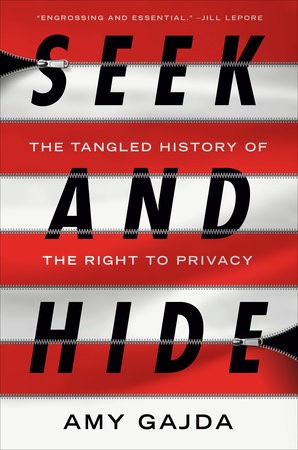New book by Tulane Law Prof. Gajda tackles origins and future of the right to privacy
The conventional account traces the origin of legal protection for privacy to an 1890 Harvard Law Review article, The Right to Privacy, written by Samuel Warren and future Supreme Court Justice Louis Brandeis, generally considered to be the most famous law review article of all time.
In the article, Warren and Brandeis raised alarm over what they saw as impending threats – new-fangled inventions like the “snap camera” and an exploding tabloid press with an insatiable appetite for scandal – and called for the invention of new legal rights protecting personal privacy.
In her latest book, Tulane Law Professor Amy Gajda takes readers on a rollicking tour of social scandals and political mudslinging reaching back to the Founders to show that American law has in fact always provided protection against the invasion of privacy – and has long struggled to balance privacy interests against the right of the press to gather and report the news.
Along the way, Gajda shows how privacy-related claims have been invoked to suppress truthful disclosures, from the vicious feuding between Alexander Hamilton and Thomas Jefferson revealing each other’s scandalous affairs in the day’s publications to the jury verdict that bankrupted Gawker for publishing online a secretly-recorded, explicit Hulk Hogan sex tape—and beyond.
The book, “Seek and Hide: The Tangled History of the Right to Privacy,” is set for release April 12 by Viking. The New York Times has named it one of the spring season’s most anticipated non-fiction books, and in its review, called it "wry and fascinating," and Gajda "an insightful guide to a rich and textured history that gets easily caricatured, especially when a culture war is raging."
It’s drawing additional significant praise nationally, in such publications as The Atlantic, which says Gajda's account, "highlights the persistent disparities in whose privacy has mattered to lawmakers and courts" and in Fortune which named it one of the "5 New Books to Read in April."
“A magnificent book that shows us that the tension between the right to privacy and freedom of expression is as old as this country yet as recent as social media and doorbell cameras,” writes constitutional scholar Erwin Chemerinsky, dean of the University of California Berkeley Law School. “At a time when we all must be concerned about what it all means for each of us, Amy Gajda has written the definitive book about privacy and the right to know.”
In an age of growing public anxiety over the erosion of privacy due to expanding surveillance and the anything-goes-forever internet, Harvard University historian Jill Lepore calls Gajda’s book “an engrossing and essential account of the origins of our present dilemma.”
On April 11, Gajda will discuss the book as one of three keynote speakers at the 2022 Global Privacy Summit of the International Association of Privacy Professionals in Washington, D.C., alongside best-selling author and New Yorker writer Malcolm Gladwell and Lina Khan, Chair of the Federal Trade Commission. The summit kicks off a series of national media appearances that includes NPR’s Marketplace.
For Gajda, one of the nation’s leading scholars on the clash between privacy and press rights, the book is rooted in part in her first career as a television news anchor and reporter, where she was confronted daily with privacy issues.
“Like many journalists,” she said, “I understand how privacy interests impact news coverage and that tension is there in the law as well.”
In her bright office, surrounded by shelf after shelf containing the books, documents and papers that served as her book’s foundational research, Gajda identifies several scenarios and court decisions that profoundly affected journalism ethics and issues of privacy across the nation. Her take: courts once swung definitively to protect press and publication freedoms and the right to free speech, but today they are more and more siding with the right to privacy.
That can be a problem, she says. Too little privacy means high profits for those peddling in secrets and great pain for those outed, but too much privacy allows the famous and powerful to shield themselves in secrecy, a secrecy that very much impacts the public’s right to know.
In the book, Gajda covers the notable cases of history—one involving many of the Founders who took separate but yet aligning sides on the press-privacy divide—as well as those that are important but barely caught notice, including the time Grover Cleveland kept a journalist in jail for reporting #MeToo truth. She follows the rise of the internet, the impact of some modern media willing to publish even the most intimate details of a person’s life, and Section 230, the law that facilitated it all.
At Tulane Law, Gajda is a professor routinely named by students as having an impact on their law school careers.
In 2020, she was awarded the President’s Award for Excellence in Teaching, nominated by students and alumni. The award is Tulane University’s highest honor for professional and graduate teaching. Gajda donated the monetary award to a diversity scholarship fund at the law school, specifically one that benefits first-generation law students. Gajda grew up just outside Detroit and was a first-generation college student herself.
Before joining the Tulane faculty in 2010, and after her journalism career, she practiced law in Washington, D.C., and then shifted to academia, holding a joint appointment in the law school and the journalism school at the University of Illinois.
Gajda similarly teaches several courses at Tulane that involve media and the law, at both the graduate and undergraduate levels: Torts, Media Law, Privacy Law, and an intensive seminar titled Legal Writing for a Lay Audience at the law school; and Communications Law and Introduction to Law and Legal Process at the undergraduate level.
“Seek and Hide” is Gajda’s third book. Her earlier books, probing the limits of First Amendment protection for academia and the press, were published by Harvard University Press. She has also co-authored two casebooks.
In 2018, Gajda was responsible for bringing to Tulane a major privacy conference titled, “Privacy, News, and the Future of Freedom of the Press.” It brought leading national journalists, publishers, legal scholars, judges, and privacy and free press advocates to the law school for a vital, cross-disciplinary discussion of the threats to press freedoms and what might be done to safeguard those freedoms.

